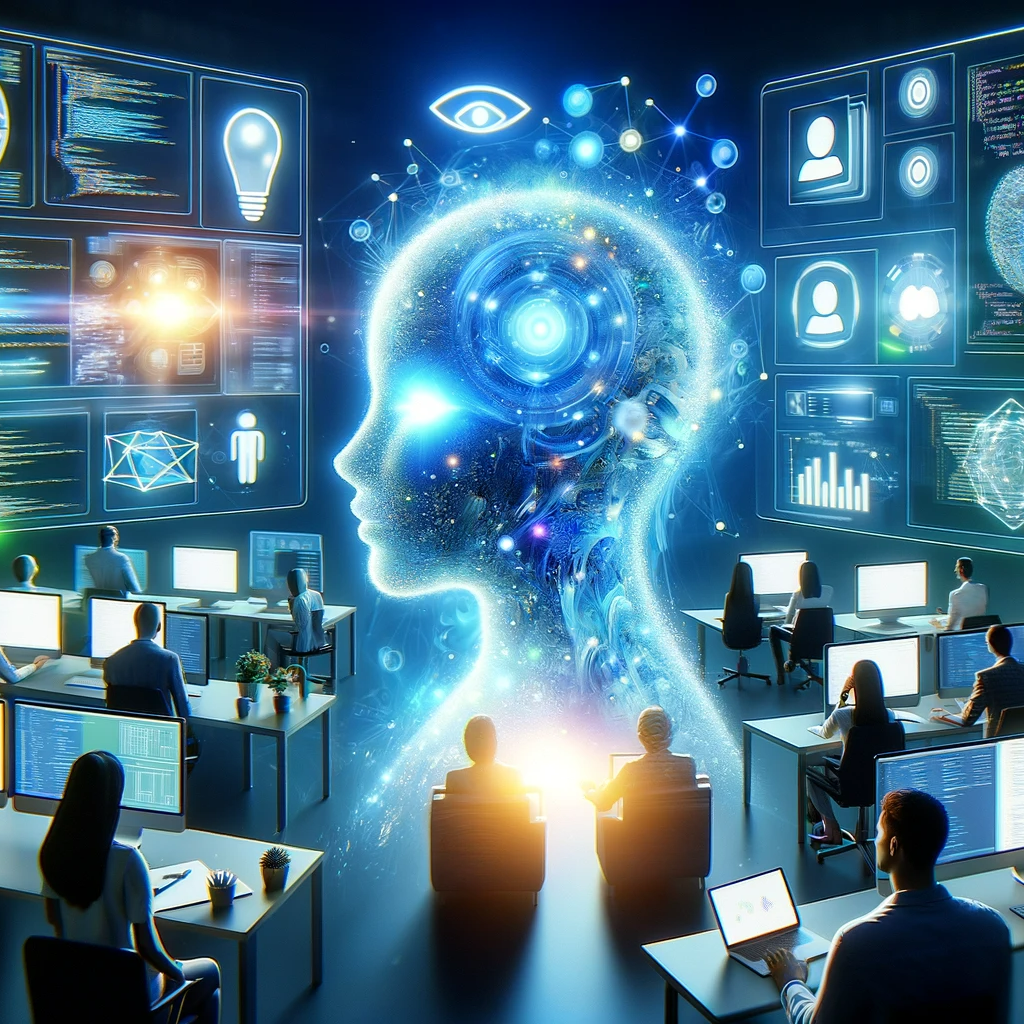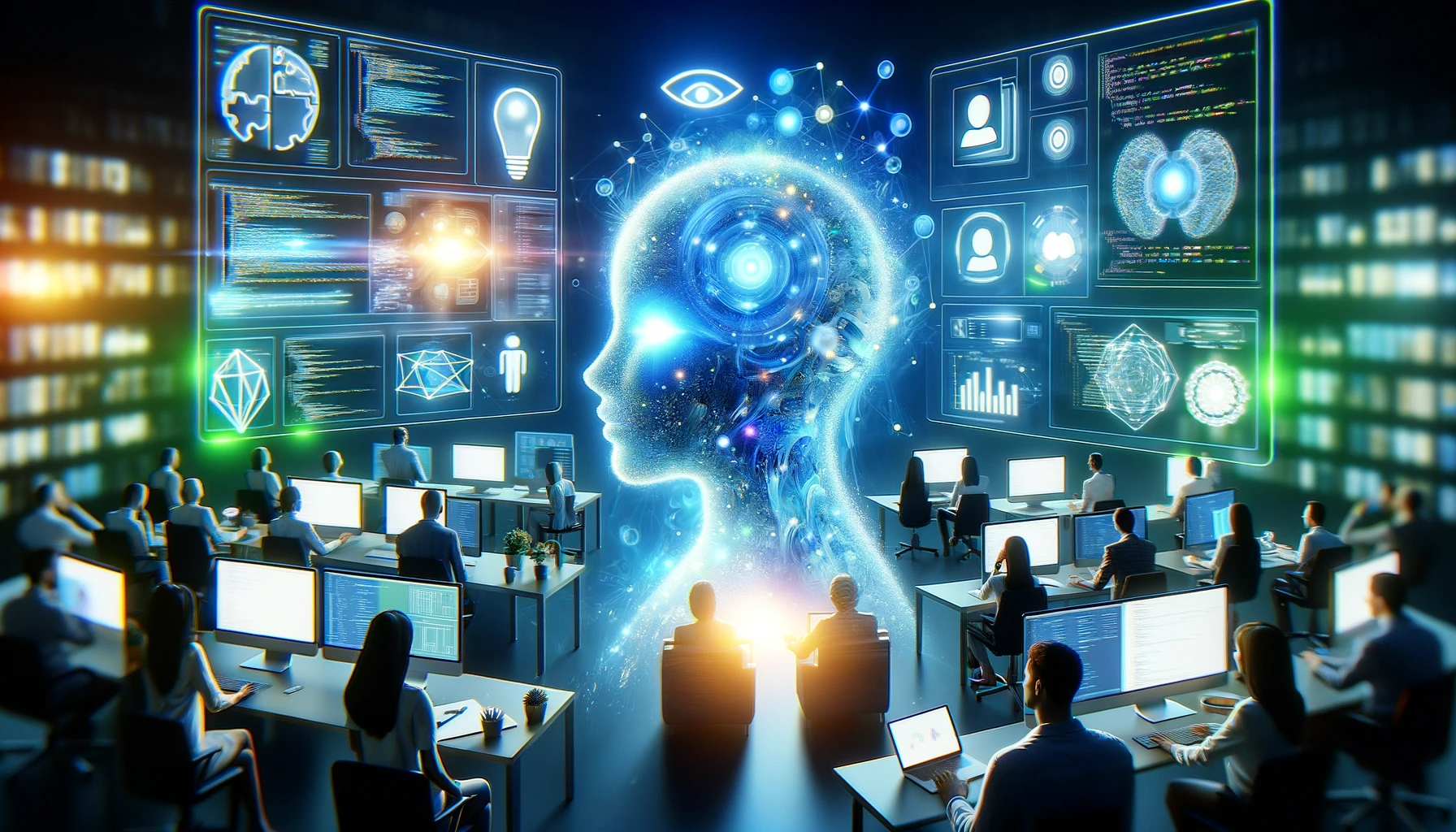Introduction
In the ever-evolving digital landscape, Artificial Intelligence (AI) has emerged as a game-changer, particularly in the field of website development. This technology, once a futuristic dream, is now a reality, reshaping how marketers approach website design, user experience, and functionality. AI’s Role in Website Development is not just about automating tasks; it’s about creating more intuitive, user-friendly, and effective websites that cater to the dynamic needs of users and businesses alike.
As we delve deeper into the 21st century, AI’s integration into website development represents a new paradigm for marketers. This integration is revolutionizing how websites are built, optimized, and maintained, offering unprecedented levels of personalization and efficiency. From chatbots and personalized content delivery to predictive analytics and automated design elements, AI is enabling marketers to craft more effective, engaging, and responsive websites.

Revolutionizing Design and User Experience
AI-Driven Design and Customization
AI is profoundly transforming website design, moving beyond traditional templates to offer customized and dynamic design options. Machine learning algorithms can analyze user data and preferences to suggest and implement design elements that enhance user engagement and satisfaction. For instance, AI can tailor website layouts, color schemes, and content based on user behavior, ensuring a more personalized and appealing experience for each visitor.
Enhancing User Interaction with AI
Chatbots and virtual assistants, powered by AI, are now common on many websites. These tools provide instant, round-the-clock customer service, answering queries, guiding users, and even assisting in transactions. By learning from interactions, these AI tools become more efficient over time, offering personalized recommendations and solutions to users, thus enhancing the overall user experience.
Predictive User Experience
AI’s predictive capabilities enable websites to anticipate user needs and preferences. By analyzing past interactions and behaviors, AI can predict what a user might be looking for and present tailored options or content. This proactive approach in website development not only improves user satisfaction but also increases the likelihood of conversion.
AI in Website Optimization and Marketing
Personalization at Scale
One of the most significant advantages of AI in website development is the ability to personalize content at scale. AI algorithms can analyze vast amounts of data to deliver personalized content to users based on their interests, browsing history, and demographics. This level of personalization ensures that users are more engaged and likely to stay longer on the website, reducing bounce rates and increasing conversion opportunities.
SEO and Content Optimization
AI is also revolutionizing SEO and content optimization. By understanding search patterns and user behavior, AI can help in optimizing website content to rank higher in search engine results. AI tools can suggest relevant keywords, analyze the effectiveness of content, and even generate content that is both user-friendly and optimized for search engines.
Analytics and Data-Driven Decisions
The ability to analyze large sets of data quickly and accurately is another area where AI excels in website development. Marketers can use AI-powered analytics tools to gain insights into user behavior, website performance, and marketing campaign effectiveness. This data-driven approach enables marketers to make informed decisions, fine-tune strategies, and optimize the overall performance of their websites.
The Future of AI in Website Development
Looking ahead, the role of AI in website development is poised to grow even more significant. As AI technology continues to evolve, we can expect even more advanced features like voice search optimization, AI-generated visual content, and more sophisticated personalization techniques. The future of website development is intrinsically linked to the advancements in AI, offering exciting possibilities for marketers.
Navigating Challenges and Ethical Considerations
Addressing Privacy and Data Security
While AI’s potential in website development is vast, it also raises critical concerns regarding privacy and data security. AI systems often rely on large amounts of user data to function optimally, which brings into focus the importance of responsible data management and adherence to privacy regulations. Marketers and developers must ensure that AI systems are designed with robust security measures and comply with laws like GDPR and CCPA to protect user data and maintain trust.
Overcoming AI Bias
Another challenge in integrating AI into website development is the issue of bias. AI systems learn from data, and if the data is biased, the AI’s decisions and recommendations will be too. This can lead to unfair or irrelevant user experiences. Marketers must work with data scientists to ensure that the data fed into AI systems is diverse and unbiased, providing equitable and relevant experiences for all users.
Balancing Automation and Human Touch
While AI can automate many aspects of website development and user interaction, the importance of the human touch cannot be overstated. Businesses must strike a balance between leveraging AI for efficiency and maintaining a human element in their digital interfaces. Personal interactions, empathetic communication, and human-driven creativity remain essential in building brand loyalty and customer satisfaction.
AI’s Impact on Marketing Strategies
Hyper-Personalized Marketing
AI’s advanced data analysis capabilities enable marketers to implement hyper-personalized marketing strategies. By understanding individual user preferences and behaviors, AI can help tailor marketing messages and offers to each user, greatly enhancing the effectiveness of marketing campaigns.
Predictive Analytics for Market Trends
AI’s predictive analytics are invaluable for understanding and capitalizing on market trends. By analyzing current data and historical patterns, AI can help marketers anticipate future market shifts, enabling them to adapt strategies proactively and stay ahead of the competition.
Enhanced Customer Journey Mapping
With AI, marketers can gain deeper insights into the customer journey. AI tools can track and analyze each touchpoint, providing a comprehensive view of the customer experience. This helps in identifying pain points, optimizing user flow, and ensuring a seamless journey from the first visit to conversion.
Embracing AI for Future-Ready Websites
As we look to the future, it’s clear that AI will continue to be a pivotal force in website development. To stay ahead, businesses and marketers must embrace AI, not just as a tool for automation, but as a partner in creating more dynamic, responsive, and user-centered websites. The integration of AI in website development promises a more intuitive, engaging, and effective online presence, paving the way for innovative marketing strategies and enhanced customer experiences.
Leveraging AI for Competitive Advantage
Staying Ahead with AI Innovation
In a world where digital competition is intensifying, leveraging AI in website development is not just beneficial, it’s critical for staying ahead. AI-driven websites can adapt more quickly to market changes, user preferences, and technological advancements. This agility allows businesses to maintain a competitive edge, offering superior user experiences and innovative features that set them apart.
Integrating AI with Emerging Technologies
The future of website development is not just about AI in isolation but its integration with other emerging technologies like augmented reality (AR), virtual reality (VR), and the Internet of Things (IoT). For example, AI can work alongside AR and VR to create immersive online experiences, or with IoT devices to provide more interconnected and responsive user interactions. This synergy between AI and other technologies opens up a world of possibilities for creating futuristic and highly engaging websites.
Ethical AI’s Role in Website Development and Sustainable Practices
Promoting Ethical AI Use
As AI becomes more prevalent in website development, promoting ethical AI use is paramount. This involves developing AI systems that are transparent, accountable, and free from biases. Businesses must ensure that AI is used in a way that respects user privacy and promotes trust. Adopting ethical AI practices is not just a moral imperative but also essential for building long-term customer relationships.
AI and Environmental Sustainability
Another aspect to consider is the environmental impact of AI. As AI systems require significant computational power, they can contribute to higher energy consumption. Therefore, businesses need to consider sustainable practices in their AI implementations, such as using energy-efficient algorithms and supporting green hosting solutions.
The Human-AI Collaboration
Enhancing Creativity and Productivity
AI’s role in website development is not to replace human creativity but to enhance it. By automating routine tasks, AI frees up time for developers and marketers to focus on more creative and strategic aspects of website development. This collaboration between humans and AI can lead to more innovative and effective web solutions.
Continuous Learning and Adaptation
AI systems are continually learning and evolving, which means that websites powered by AI can continuously improve and adapt over time. This dynamic nature of AI-driven websites allows for ongoing optimization and refinement, ensuring that they remain relevant and effective.
Conclusion
In conclusion, AI’s role in website development represents a significant shift in how we approach digital marketing. By harnessing the power of AI, marketers can create websites that are not only visually appealing and functional but also deeply aligned with user needs and preferences. As AI technology continues to evolve, its integration into website development will undoubtedly open new frontiers, redefining the digital landscape for years to come.
Also, like my other post The Aesthetic Appeal of AI in Marketing: Creating Visually Stunning Campaigns.


Add a Comment